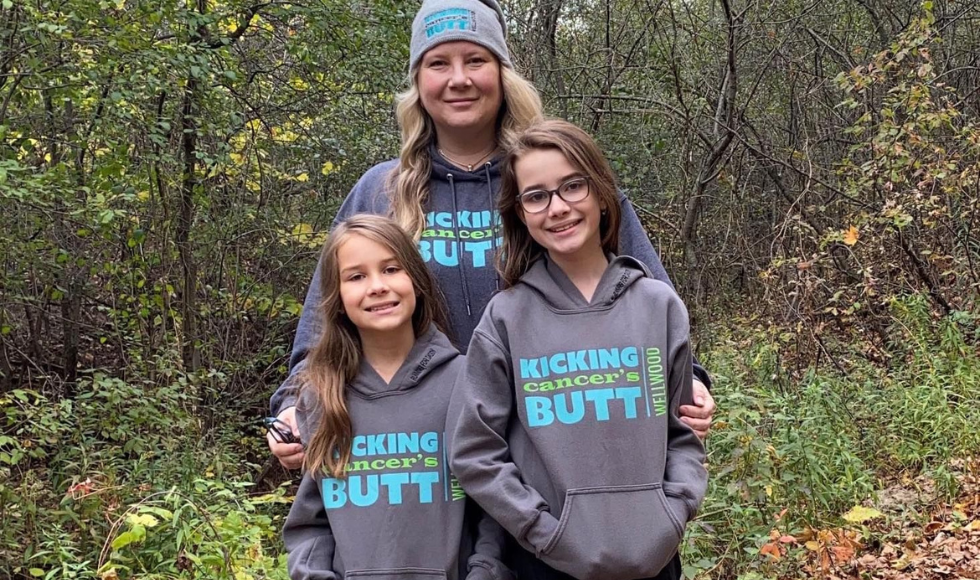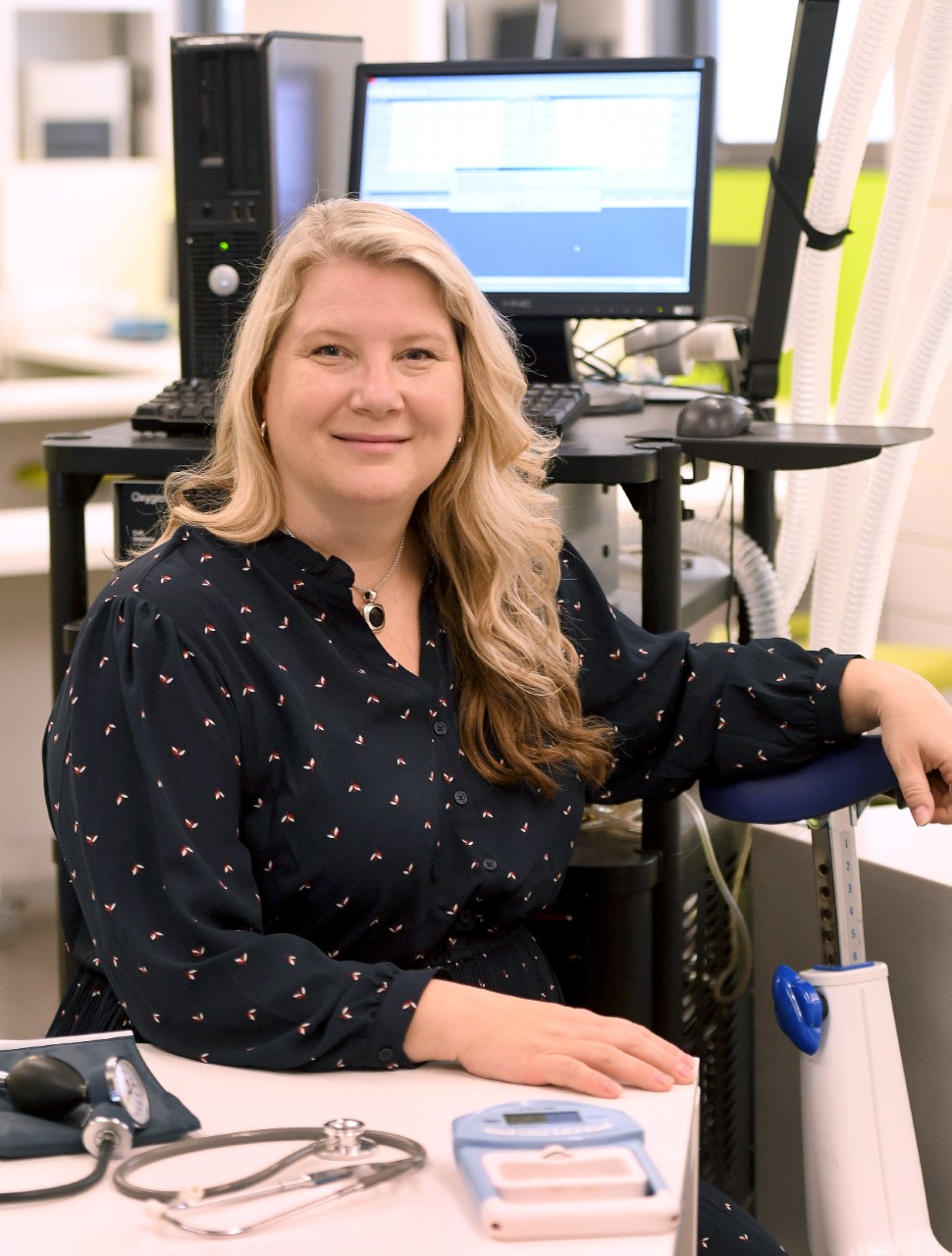“Teaching got me through the hard time” – When the classroom became a refuge for Kinesiology’s Krista Howarth

Assistant professor Krista Howarth with her daughters Alexandria and Avery at Wellwood Resource Centre's annual Kicking Cancer's Butt fundraiser. Howarth says teaching, and the kindness of students and colleagues, got her through the 20 months that her husband battled cancer.
No one in the Faculty of Science has more teaching awards than Krista Howarth – and there’s likely no one at McMaster who’s more grateful for the opportunity to teach.
Teaching does more than energize Howarth. For 20 heartbreaking months at the start of her career, the classroom was her refuge.
“Teaching got me through the hard times,” says Howarth, an assistant professor in the Department of Kinesiology. “I couldn’t have done it without my students and the support of friends in the department.”
Howarth’s world began collapsing on Sept. 13, 2013 at the Juravinski Hospital. Her husband Jason Russell — who ate right, exercised religiously and rarely got sick — knew something was horribly wrong. Test results were in and Russell’s doctor said it was news that could only be delivered in person and as soon as possible.
Russell had Stage 4 colorectal cancer. There was a long road ahead – surgery, chemo and radiation. The diagnosis was devastating but the prognosis was good. Russell was just 39 years old and a ridiculously proud dad to three-year-old Avery and one-year-old Alexandria. There was a lifetime of milestones and moments to live for.
On the drive home from the hospital, Russell kept apologizing to Howarth for indefinitely postponing their wedding and honeymoon, even though it had been a mutual decision.
They’d known each other since elementary school – Howarth was the serious and studious student while Russell was the class clown.
He proposed five years earlier on Valentine’s Day, but only after first checking with Howarth’s dad. “My parents adored Jason, which was good because we were living in their basement at the time.”
A wedding and honeymoon had to wait – Howarth was finishing her PhD and they were saving up to put a down payment on a house. They were turning a fixer-upper into their home when they started a family, and the wedding and honeymoon plans were postponed yet again. “I was pregnant with Avery while laying hardwood.”
When she wasn’t doing home renos, Howarth was teaching in the Department of Kinesiology on a contractually limited appointment. She’d found her passion while doing her PhD: “I’m a talker and not a writer.”
Writing endless grants and research papers held zero appeal. Her supervisor, Martin Gibala, asked Howarth if she was interested in taking over one of his undergrad courses, and she fell in love with teaching.
“Some people go for a run to get an adrenaline high. For me, it’s stepping into a classroom. I’m energized, the students are energized and we build off each other.”
Howarth continued teaching between Russell’s clinic appointments and hospital stays. She told her students what was going on. They were grateful to be kept in the loop and would tell Howarth how they were going through similar struggles.
A year after Russell’s diagnosis, doctors said he was in the clear. Howarth and Russell were looking forward to better days. But then a follow-up scan found more cancer. Doctors initially thought the rectal cancer had spread – what were the odds someone that young would have a second unrelated cancer? They eventually figured out Russell had a new and far more aggressive cancer in his bladder, which would prove to be a much harder fight.
There were more surgeries and more rounds of chemo. None of it worked. Russell was admitted to hospital for a final time in February 2015.
What followed broke Howarth’s heart – she had to tell her oldest daughter that her dad was never coming back home. “That was rock bottom.”
Howarth had a children’s book about cancer that she’d read to her daughters, with pages that could be swapped in and out. She’d originally removed the pages about dying and death. Avery noticed right away that her mom had put those pages back in the book.
Howarth took a leave from teaching near the end of the term so she could be at the bedside with Russell during his final weeks. He asked that his daughters stay home – he was wasting away and didn’t want that to be their lasting memory. Howarth left his bedside for only a few hours to drop in on the farewell party for her graduating students – she got changed in Russell’s hospital room.
Howarth’s students and colleagues had always been supportive. Now they stepped it up in a big way: The graduating class pooled their money to buy gifts for Howarth’s daughters, including LeapPad tablets, headphones and other gifts to keep them entertained and distracted while mom was with dad at the hospital.
Colleagues in the Faculty of Science’s Office of Undergraduate Studies – Howarth had worked there for a stint as a student advisor – dropped off meals. Howarth’s daughters went to the McMaster Children’s Centre, and a staff member who lived near the Juravinski Hospital offered up her driveway as a free parking spot any time day or night.
Howarth had promised Avery that she’d have a birthday party no matter what happened. “She was turning five. That’s a big deal for any kid and Avery was going through a lot. She deserved a party.”
Howarth had secretly assembled her gift – Avery’s first big-girl bike – and booked a venue.
Russell died on Wednesday, April 22. His celebration of life was held the following week, just four days before Avery’s birthday party.
The party would go on. Howarth’s colleague, professor Maureen MacDonald, and a team of grad students hosted Avery’s party: Buying and serving the cake, filling up and handing out goodie bags, loading all the presents in Howarth’s car and making sure every kid – and especially Avery – had a great time.
“I just had to walk through the door and take a seat. I was in a complete daze. I’m sure the other parents were wondering where I’d found this amazing army of helpers.”
Howarth was now a single parent with a five-year-old and a three-year-old. And with her contract ending, there was a very real possibility she’d be out of a job. The Faculty of Science was in a budget crunch and it was unlikely the Kinesiology department would get funding to add a teaching track position.
“I was told to start applying to other universities.” But uprooting her kids and moving away from her parents wasn’t an option. “I was fully prepared to walk away from teaching and do something else.”
Yet impossibly long odds finally broke in Howarth’s favour – funding came through and she was hired as a permanent faculty member.
Today, she’s an assistant professor and the associate chair of undergraduate studies in the Department of Kinesiology. There’s a wall full of student and peer-nominated teaching awards in her office, although they’re outnumbered by her daughters’ photos and artwork.
 She threw herself into learning new ways of teaching. If the MacPherson Institute offered a workshop, Howarth took it.
She threw herself into learning new ways of teaching. If the MacPherson Institute offered a workshop, Howarth took it.
She started seeking constant feedback from students, with two conditions – no personal attacks and there had to be suggestions on how she could do a better job of teaching. She’s adopted many of their ideas.
She also learned how to start saying no.
“There was a time when I couldn’t let anything go — everything down to the smallest details in every lecture had to be perfect. But I realized during Jason’s final months that I couldn’t be everything to everyone. I started putting my energy and efforts into the right places for students.”
Howarth knows there’s likely someone at McMaster who’s bracing for impact and whose world is about to collapse. She has two pieces of hard-earned advice.
Those first weeks and months after a diagnosis will be unbelievably stressful. “Cut yourself a whole lot of slack. Give yourself grace.” The journey will be a marathon, not a sprint.
And know that there will be good days and bad days, with no guarantee of how many of each you’ll wind up getting. Don’t squander the good days, says Howarth. “That’s my deepest regret. We were told and we assumed Jason would make it through and there’d be many good days ahead for us.”
Two of Russell’s good days were spent at Kicking Cancer’s Butt, an annual fundraiser at McMaster organized by Wellwood Resource Centre, a community-based non-profit.
The entire family took part just weeks after Russell’s initial diagnosis. They went back the following year. The year after that, it was just Howarth, Avery and Alex, with a ton of support from family and friends.
The fundraiser remains a family tradition and a way to honour Russell. Last year, Alex and Avery raised more than $1,300 in their dad’s memory. They plan to take part again this year.
“Being together and helping others is the best lesson Jason taught us.”


